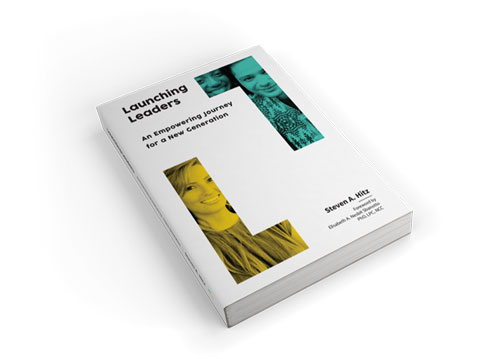It has been said that those without vision, perish. To establish vision, or to create a future you can positively see yourself in, requires building a confidence in who you really are. The process of homing in on your true identity is key. Establishing vision is also key to anyone’s success but is especially cogent to anyone facing the challenges of depression and anxiety; which is basically all of us.

Vision does not exist without change. To establish clear vision then requires the willingness to change. The question for those of us who find ourselves wandering along a path from side to side and not visualizing the meaning of our steps is to ask ourselves, what (or whom) will motivate me toward change? What type of change is needed in my life? Am I willing to question the status quo and invite the idea of asking important questions, some that might be in the category of doubting my foundations and being bold enough to question my doubts? What are my desires exactly?
It sounds complex, but if we can establish some markers along the path, we CAN navigate a journey toward freedom and peace.
Recently my wife and I decided to abandon the busy world where we live and go to the mountains for a few days. In conjunction with disconnecting from the “hum” of the world, I gathered several books I have wanted to dive into. One of them ironically, was Walden by Henry David Thoreau. What nature provides, especially away from most civilization, is scale and context; a space to figure out ourselves and some of life’s biggest questions. It provides silence, solitude, darkness—some of the sparsest resources we know.
Our trip started off with a stark reality check on how much our lives have become electronically entwined and supported by “things.” We did not have cell service in the high mountains, but when the stars came out, our cells could pick up snippets of civilization from the ten thousand-foot airwaves.
As we settled into the first night, I drifted off into a deep slumber, fresh night air caressing my content face. Suddenly my wife woke me up. She said “Steve, we’ve been robbed.” I sat up from my sleep, thinking someone had broken into my truck—that someone had ventured into our camp and was helping themselves to whatever was in the open. Certainly no one had entered our camper. I reached for my gun case and prepared for the unknown—maybe it was a bear or lion staking a claim on their own land. She then said to me that we were not being robbed in the mountains, but that our home back in town had been robbed. She received a text from our neighbor that went something like this “We closed your small garage door—we think you are camping.” Evidently, we drove away with the garage door open. And then, the most alarming garbled text addition followed “Many media objects have been removed.” End of text.
We had just moved into our new home and there are still many things unpacked, items not assembled, plus the basement is still being finished. Workers have been in and out for weeks. We had in our garage several media objects yet to be installed (big screen TV’s sound bars, etc..). My mind went to inside the house. Were our installed objects removed? Did they steal my computer systems? What about our laptops? The safe? The more I contemplated, the more anxiety coursed through my veins.
We had not had an alarm system installed yet—–safe neighborhood we thought, though we intended to install one soon. There were construction workers across the street working on a new home and they probably saw us roll away in our rig leaving the garage door up. We jumped to judgment—-wrongly.
We couldn’t call or text our neighbor—somehow the text from them arrived, but no signal allowed a communication back. It was about midnight; we jumped in the truck and made our way down the mountain toward signal. Once we made it back to the highway it was only about 15 minutes to arrive at a rest area that overlooked the Laramie basin. Our cells indicated “two bars.” We called our neighbor. Joleen didn’t answer. We called her husband. Dave picked up. He was so kind and when we explained the two-part text we received, he almost laughed because they DID NOT text the last garbled part about media objects being removed. We took in a deep breath of relief but to make sure, asked if he would walk next door to check it out. He walked through the house and noted our computers, TV’s and other such “media devices” were in their proper place. We had NOT been robbed.
Back to the camper we drove, with a great sense of gratitude for great neighbors, for the blessing of not being robbed, and that our lives of “things and connectivity” need not be disrupted.
Here we were (again), under the stars of the dark night, cold mountain cold air, warm blankets, and sleep soon found its way into our bodies and minds.
Now contrast this startling event with my reading of Walden. Those familiar with his writing will understand the conflict this put me in. Do I actually hold a “world view?” Am I consumed with the hum of the world? Would my life be greatly diminished if I didn’t have a cell phone or computer? Has my mind and heart been shielded from hearing my own voice—or worse yet, the voice of my maker?
In regards to understanding my own identity, am I really there yet? How much is enough? I believe I know my divine heritage, but I also believe I am an amalgamation of several faith tributaries—-which blend together to build my own river of faith. What is the balance of all of these streams and do I need to focus on some aspects more than others? And as it related to the scare of being robbed, in what ways can I lower my anxiety about “things” by simplifying and reestablishing my order of values?
Such are the thoughts that washed over me the next morning with the mountain breeze, some good books, and after the threat of a media crisis. Nature has a good way of putting things into proper perspective.
Which leads me back to the topic of CHANGE as relates to leaving the dark recesses of our lives and finding new light. I hope you find these five considerations from the mountain top helpful:
- Recognize change doesn’t require a complete knowledge of anything. Confucius said “To know that we know what we know, and that we do not know what we do not know, that is true knowledge.” We don’t need a certain knowledge of things to change. We only need to know what we know, and to recognize we can’t ever know it all. Much of what we know will come through reading. Surround yourself with a wide variety of books; read broadly.
- Evaluate your current value system. Certain values are not absolute and can be reordered in your hierarchy of things. In my recent experience, I realized that even IF we had been robbed, we are only talking about “things.” I decided to not place so much emphasis on my digital world; that my world of discovery would be better served by books, prayer and meditation. In other words, I could CHANGE the value I put on my values.
- Find your truth—ask the hard questions. Timothy Keller in his book, The Reason for God, quotes the sociologist Peter L. Berger regarding discovering truth. “We cannot avoid weighing spiritual and religious claims by hiding behind the cliché that ‘there’s no way to know the Truth.” We must still do the hard work of asking: which affirmations about God, human nature, and spiritual reality are true and which are false?” We still have to search out answers to life’s most important questions. Ask questions, gain understanding from doubts and doubt your doubts. Put some deep thought into how you fit into the universe; more specifically, the life you are currently living. Not finding all the answers is fine, but not seeking answers is not.
- Go Camping and Simplify. You don’t have to go to the mountains; but go to wherever your mountain is. Read lots of good books, ask hard questions, meditate and ponder on values and the path forward. Be willing to CHANGE. Said Henry David Thoreau, “Most of luxuries, and many of the so called comforts of life, are not only not indispensable, but positive hinderances to the elevation of mankind.” This was written in the 1800’s.
- Get an Alarm System. Develop your own sense of boundaries regarding the “hum” in your world and check your devices in for a time. Find and listen to your own voice. Create a space for faith and pondering; a place you can ascertain the direction you are heading, and if that direction is in line with the vision you have established. Create your own warning signs and watch for distractions. Your personal alarm and warning system will keep you moving in the right direction. And yes, I’m installing cameras and an alarm system to ease my mind; but establishing an internal alarm and warning system is even more important.
Vision is about finding the path forward. Vision requires change. The ideas outlined herein help light the path forward and propel you toward the vision you established. From his simple economic life, the well-read Thoreau said “I learned this, at least, by my experiment; that if one advances confidently in the direction of his dreams, and endeavors to live the life which he has imagined, he will meet with a success unexpected in common hours.”
Establish your vision (the life you imagine), make necessary (and constant) changes, and emerge into a world of freedom, peace, and confidence.





